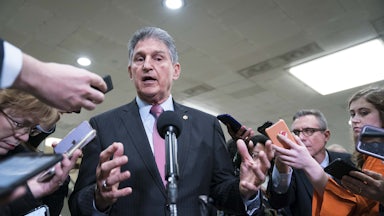When the second and final impeachment trial of Donald J. Trump begins Tuesday, Lewis Carroll may prove a better guide to unraveling the proceedings than the squads of legal experts in boxes on cable TV.
Trump’s lawyers will certainly make the risible argument that the president was simply offering a learned commentary on election laws rather than inciting people to riot with his incendiary words at the January 6 rally. That claim should bring to mind Humpty Dumpty, who said in Through the Looking Glass, “When I use a word, it means just what I choose it to mean—nothing more and nothing less.”
There is also a Carroll quote to go with the contention that Trump was impeached too quickly in the House (without time to hold hearings) and that he was brought to trial in the Senate too slowly (only after he had left office). That argument calls to mind the moment when Alice is sternly instructed that jam is available only every other day. “The rule is,” the Queen explains, “jam to-morrow and jam yesterday—but never jam to-day.”
Democrats too will be thrashing about in Alice’s Adventures in Wonderland. The Queen tells Alice her concept of a just trial: “Sentence first—verdict afterwards.”
That unfortunately seems the foreordained outcome of the Senate trial. Trump will be sentenced to absolutely nothing other than the steady drizzle of self-pity that already is his constant companion in his Elba-like exile at Mar-a-Lago.
The verdict of acquittal seems equally predetermined as the Republicans continue to morph from a political party to a cult of personality. Even with Mitch McConnell (yes, Mitch McConnell) nominally on the fence, The Washington Post counts 37 certain GOP votes (three more than Trump needs) against conviction.
The daunting arithmetic appears to have convinced most Senate Democrats not to waste time with a protracted trial. As a result, the odds are high that there will be no impeachment witnesses, even though Democrats unsuccessfully begged for them during Trump’s first trial, over his “perfect” phone call to the president of Ukraine.
This time around, the Democrats, who now control the Senate, are squandering their last opportunity to put Trump in the dock—and to convince at least a small slice of the Republican Party to return to something resembling sanity. Dramatic testimony by witnesses represents the only way to turn the Trump trial into a compelling must-watch event. Even the planned heavy emphasis on video presentations will make the proceedings come across as just another TV show rather than an opinion-shaping end to the Trump saga. Something out of the ordinary has to be done to prevent the assault on the Capitol from fading into another disputed controversy of the Trump years.
The Democratic House impeachment managers, led by Jamie Raskin, long for witnesses, which is why they asked Trump to testify under oath, an offer he promptly rejected. Even without the Inciter in Chief, possible witnesses include Capitol police officers who experienced violent aspects of the attack that were not visible to members of Congress or TV cameras. Mike Pence, attacked by Trump and then abandoned to his fate, would offer a riveting perspective on January 6. It would be fascinating to hear from Pence’s lips his account of Trump telling him, “You can either go down in history as a patriot or you could go down in history as a pussy.” Another important witness might be Mark Meadows, Trump’s final chief of staff, who belatedly pleaded with the president to do something about the rioters, or else “they are going to kill people.”
The House impeachment brief is a powerful document with only one flaw—frequent use of the word “reportedly” to cover the reality that news stories are the basis for much of the case against Trump. For example, the brief states, “President Trump was reportedly ‘delighted’ by the mayhem he had unleashed, because it was preventing Congress from affirming his election loss.” That assertion would be so much more arresting if it were based on direct testimony rather than White House reporting.
Yes, it is easy to understand the fatalism of Senate Democrats who hope that they can wrap up the trial this week. The senators calculate that since Trump will wiggle off the hook yet again, why prolong the agony? What’s more, a Trump trial will shut down other legislative business, so the sooner the curtain falls on Impeachment Redux, the sooner the Senate can return to confirming Joe Biden’s appointees and preparing to debate the Covid stimulus package.
That argument might be convincing were it not for the fact that the Senate won’t be debating much of anything in the immediate aftermath of the trial; it will be in recess next week or, as the Capitol Hill euphemism dubs it, a “State Work Period.” The nominal excuse is that February 15 is Presidents’ Day, a federal holiday. Of course, Presidents’ Day is not exactly a revered moment on the calendar, unless you are a car dealer promoting a sale with George Washington or Honest Abe. In truth, what better way to honor our greatest presidents than to mount the most convincing case possible against the only president in history to encourage a putsch against Congress?
If Democrats did decide to hold a full-throated impeachment trial, the hope is that some Republicans would belatedly realize that the choice facing the nation has always been between Trumpism or democracy. Yes, it is chilling that 71 percent of all Republicans in a recent national AP-NORC Poll absolve Trump of almost any responsibility for the assault on the Capitol. But it is also possible to find encouragement in the 11 percent of GOP respondents who said that Trump had a “great deal” of responsibility for the riot and the other 18 percent who said he had a “moderate amount.” The goal of the Democratic impeachment managers should not be to preach to the choir but rather to appeal to that 29 percent of Republicans who recognize that Trump is, at least, partly to blame for January 6.
In a previous piece, I questioned the wisdom of impeaching Trump when it was too late to remove him from office and the odds of a Senate conviction were low. But having taken that fateful step forward, the Democrats have an obligation to the nation and to brave House Republicans like Liz Cheney to do more than simply go through the motions.
Calling witnesses in the Senate is the best way that the trial can offer the definitive verdict on the saddest day since the Civil War as American democracy hung in the balance.








